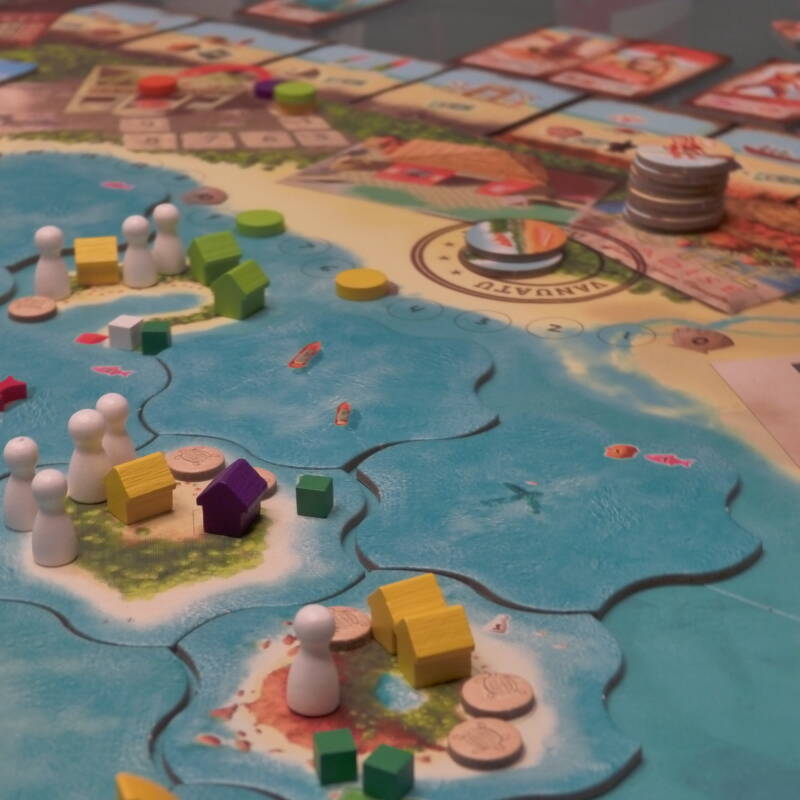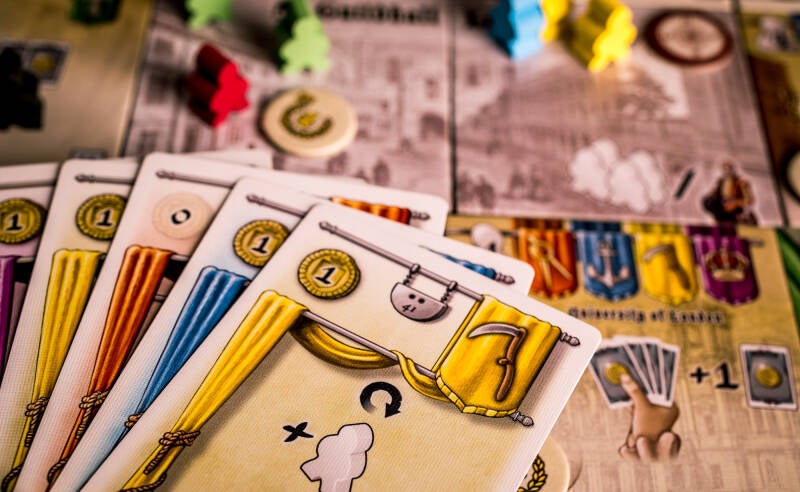Is that a knife in my back?
The meanest games in my collection
Hubby Yves and I form one of those boring couples that hardly ever fight. I can’t remember the last time we had a fight. I do remember the first fight we had. It was over a game of Mage Wars. He was spamming creatures and lairs as the Beastmaster, while I was sending out my demons and imps as the Warlock. Mage Wars is an interactive game of battling Mages, think Magic: the Gathering, but with the added tactical element of a board on which your summoned creatures move, and without the luck of the draw, as you have a spellbook you created just as you would have built a deck in Magic: the Gathering, but when you feel like casting another spell or summoning a creature, you just go through your spellbook to find the card that will get you out of the pickle you’re in or will deal the finishing blow to your opponent.

So Yves and I were sitting opposite each other with the big board between us and frustration was growing on both sides: Yves got frustrated because a lot of my creatures had the flying ability, which just as in Magic: the Gathering makes them harder to block and gives them more mobility, and then one of my flying creatures swooped down to attack one of his creatures… and got killed by a lucky dice roll of Yves. We got so caught up in the game that we just were so angry at each other for the aggression and ruthlessness we demonstrated. Losing a creatures felt like losing a limb. Things got heated – we never finished that game.
Thinking back at that time in our gaming history (at that time, we were new to modern boardgames, Yves had gifted Mage Wars to me because he thought it would be a nice way for us to enjoy a Magic-like game without playing Magic (which he doesn’t like). Since that time I feel we both grew as gamers (and hopefully as humans too) – we aren’t really multiplayer solitaire gamers – we actually like it when a game forces us to be on our toes and aware of what the opponent is doing, and if the game offers you options to hinder your opponent, we don’t play nice for the sake of being nice – just as we don’t play mean just for the sake of being mean, we don’t spare each other while playing just because we are partners. This sometimes surprises other players at our table, but we’re cool with it, as we have both learned to see the game as “just a game”. Sometimes a mean move is what you need to do to get the win, and in that case, I’m fine with being the victim of that particular mean move (as I realize I would probably do the same thing if the situation were reverse).
As I recently did a post on the most relaxing games in my collection, I wanted to do an opposite post, of some of the meanest games in my collection. I will not include games like Mage Wars or other fighting games in this list, because in those games some meanness is expected as the goal of the game is to fight and destroy your opponent(s). In the games I list here the mean streak can sometimes be more subtle or even unexpected.

Dominant Species
This is often described as an uber mean game. It happens to be one of the first modern ‘big’ games I played, and I fell in love with it instantly. The mean factor comes from two crucial game elements: the planning of actions, and the powerful domination cards. Dominant species is a worker placement/action selection game in which players have a certain amount of action pawns that they place on a tableau of actions that will be resolved from top to bottom, left to right. So in most action rows it matters if you are first to perform the action, and the actions that were triggered before you (either from the same action, or from actions higher up in the resolution chain) might result in you being left empty handed because the state of the board has changed because of previous actions. Careful planning and risk assessment and trying to predict your opponents moves for the round are important. If you don’t like that aspect, Dominant Species Marine might be more up your alley, as in this remake you resolve the action immediately after placing your action pawn.
The domination cards are played by action in the bottom action slots. These cards have powerful one-time effects. In fact, each of those cards seems overpowered. You will want to play them yourself, just because you don’t want to be the target of them, or if the effects are brutal on a global scale, you want to steer it in such a way that your opponents suffer more from its effects than you do. Or you could choose to not play the card at all. In most of the cases the domination cards drastically change the board state for at least one player and the effects can feel really mean of you are the main victim/target. There is no player elimination in Dominant Species but there may be times that you feel your species is decimated and you have to build up again from virtually nothing. The game is epic in that way, and it is part of why I love it so much.
Vanuatu
Vanuatu looks all sunny and nice and friendly with its sandy beaches and pastel colors. (it’s actually about careful planning, watching your opponents, making sure you set yourself up to be able to perform all your actions, and maybe along the way preventing an opponent from being able to do theirs – same in Agricola: with limited workers/action per round and most of the actions requiring you to have done other stuff before you can do them (planting crops, getting animals) an opponent can easily spot what you’re up to and snatch the action you desperately needed) idem Bus (when you’re late in turn order, there are times when you can’t really do much to help yourself, and your best play might be to srew over your opponents – like going down and drawing everyone else with you). It is a game that looks all sunny and nice and friendly with its sandy beaches and pastel colors. But it is in no way a ‘friendly’ game. I have had a play of this in which a player just walked away mid-game because they couldn’t handle the interaction (or ‘meanness’), and I have had a play in which a player did sit out the game but with a face as long as a fiddle because they prefer multiplayer solitaire games… So be warned, and warn your fellow players before setting this up and promising everyone a good time. Vanuatu is a game of careful planning, of taking risks that might bring you great rewards but could just as well fizzle, a game that requires you to keep a close eye on your opponents as they will be out to hinder you just as much as you will try to hinder them.

This is an action selection game. First, players select a role that will bend a certain rule in their favor for this round, for instance by making a certain action more profitable for them. Players have 5 action pawns to distribute over 9 possible actions. In turn order players first place 2 action pawns (on the same action or not), then another 2 (and they can revisit action spots they have already assigned action pawns to) and then the final one. There is no limit to the number of action pawns that can be on any one action spot. In the next phase players will perform actions, one at a time, in player order. But here’s the catch: you can only perform an action of the action spot where you have the majority of action pawns over the other players (in case of a tie, you have majority if you are earlier in player order). When you perform the action, you remove all your action pawns from the action spot – this means that another player who was unable to perform the action because they didn’t have majority, can in a future turn perform that action. And this is a big part of the meanness of the game: if you have majority in several action spots, you can block opponents from performing the action they so desperately need as long as you don’t remove your action pawns. In case a player can’t perform an action because they don’t have majority anywhere, they are forced to retrieve their action pawns from an action spot without taking the action. And that hurts. Especially if you were relying on a certain order to perform your actions, for instance first move your boat (with a sail action) to a tile where you can fish or dive for treasure – but if the opponent with majority on the sail action first does other actions (because they aren’t blind and see how you have tried to plan out your actions so they feel they can hinder you by not taking the sail action first) you can’t sail and you might be forced to retrieve action pawns and your whole chain of actions just snaps. Rest assured: you will be trying to do the same to your opponents.
If you have a group of players who like planning while watching their opponents like a hawk, and who don’t mind this kind of interaction, Vanuatu is a great game and deserves at least one play.


Guilds of London
This is an area majority game with a modular board: guild tiles are added to the central play area every round. It has multi-use cards you will use in different ways to perform all sorts of actions. A big part of the game is sending your liverymen (meeples in your player color) to the guild tiles, trying to control the guild in question. You will want to control certain guilds, because it will work towards end-game goals for instance. At the end of the round, the guild tiles that meet their liverymen requirements (there needs to be a minimum number of liverymen on them in order to be ‘scored’). When a guild get scored, the winner will get an awesome bonus, which is also a reason you will want to gain control. That’s all pretty straightforward. But there is more, and in that resides the genius (and the meanness) of this game: there are so-called neutral liverymen (represented by black meeples) that players can acquire throughout the game. These are anything but neutral, in fact I think this is typo, I’m convinced they were supposed to be called the nuclear liverymen because they can really blow up this game. How? Well, just before a tile gets scored, there is a so-called negotiation phase (also a euphemism) in which players who have one or more neutral liverymen in their supply, can in turn order decide to swap players’ liverymen (of any player, and the active player doesn’t even have to have presence on that guild tile) on the tile with those neutral liverymen and thus shake things up big time. You can start out with a comfortable majority on a certain tile, but that can change quickly in the negotiation phase if there are enough neutral liverymen out there to supplant your liverymen.
I love this game, but I will never (again) play this with players who like to plan their strategy and then roll out their plan over a couple of rounds. They will leave the table crying. It is brutal how much havoc just one neutral liveryman can wreak. Players who don’t like this kind of direct interaction (it’s one thing when it comes from the player who is your direct competitor for control over a certain guild tile, but it is a whole other thing when another player, with no stakes in that guild, can decide to send their neutral liverymen to the tile because they don’t want you to get the bonus of that particular tile because that would have consequences for another guild tile where you two ARE direct competitors. It’s not personal, until it is. Also, you can use the neutral liverymen as a constant nuclear threat: you can leave them in your supply, scaring off your opponents without actually using them – maybe for the entire game – more likely until one of your opponents slips up and you can take advantage of the neutral liverymen.

Guildhall
This is a set collection card game in which players play cards (cards are suits of 6 guilds in play) to their tableau and then trigger the ability of that card – the more cards of that guild out in their tableau, the more powerful the action. The game has a number of re-implementations, or stand-alone expansions so you will, and you can mix and match the guilds of each game to your liking. Either way, each game box has at least one interactive/mean guild of which the ability will let you destroy or even steal cards from your opponent’s tableau. This can be harsh if you are building up a specific guild in order to score it, and then your opponent just swoops in and destroys or steals part of your guild, forcing you to start over (a guild is complete if you have a set of its cards in all the 5 colors, and then you can move it to your score pile – you can use it later in the game to score even more by exchanging guilds for points for instance, or other bonuses).
You can of course combine guilds without including any of the mean guilds for a more peaceful game, but the game might loose some of its tension that way.

Basilica
If you think area control majority games don’t work with 2 players, you should definitely check out Basilica.
This is a game I initially got about a decade ago, when I set my first steps into the world of modern boardgames and was always on the lookout for great 2-player games, as Yves was my main (= only) gaming partner. We played it a couple of times and then I traded it away because my storage space was very limited then and I wanted to try a lot of different games. The game got a new edition recently – this second edition was released at Essen Spiel last year. We played it at Spiel and now played it again at home.
[ImageID=7282781 medium]
Basilica is a tile laying game of area majority in which players build a cathedral. On your turn you get to perform three actions, in any combination and order. There is a market of 6 tiles – 3 with their color side up, 3 with their order side up. The actions you can choose from are: place a vault (a tile with its color side up, adding it to the cathedral), placing a builder, executing an order from one of the tiles with the order side up and then discarding that tile). With the colored tiles you add to the cathedral you will try to create patches of the same color and claiming ownership of that patch by placing one of their 5 builders on the tile they just added to the cathedral. Orders let you perform all sorts of actions, from moving a builder, removing a builder, placing scaffolding (neutral, no color) tiles to block the expansion, remove a tile from the cathedral, etc. Some orders let you promote one of your builders with one of the three promotion tokens you get at the start of the game – these let you score extra points or win ties. And some orders give you a powerful action but offer the opponent a chance to also get a counter move – if they pay a coin for it. Each player gets one coin at the start of the game, and if you decide to use the paid action of an opponent’s chosen order, you pay the coin to them. This is very powerful, as your opponent can choose to not use a coin for the rest of the game and in doing so block you out of performing paid actions.
[ImageID=7127797 medium]
The game has 3 scoring phases that are triggered when the queen has advanced 10 steps on the track. The queen moves one step when a tile with a crown symbol is added to the cathedral. In a scoring phase each colored area with at least one builder on it is scored. The player with the majority of builders on it gets 1 point per tile in the area, the other player gets 1 point for each of their builders in the area. After each scoring two rows of tiles are removed and all builders return to their owner.
[ImageID=7282782 medium]
The powers (the order side of the tiles) are what makes this game so great. Each of them feels powerful and can really disrupt the plans of your opponent. But in that sense the game can also feel confrontational and mean. So if you are looking for a peaceful, multiplayer solitaire game of building a cathedral, Basilica is not the game you want… If, on the other hand, you are looking for an interactive game of area control that works well with 2, this is definitely worth a closer look! This new edition comes with a small expansion right in the box.